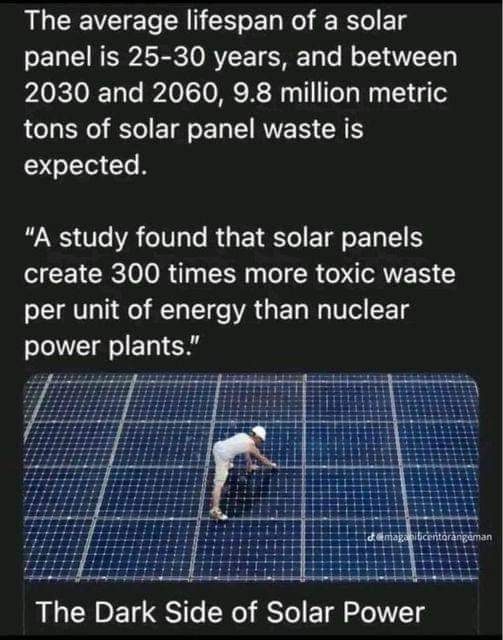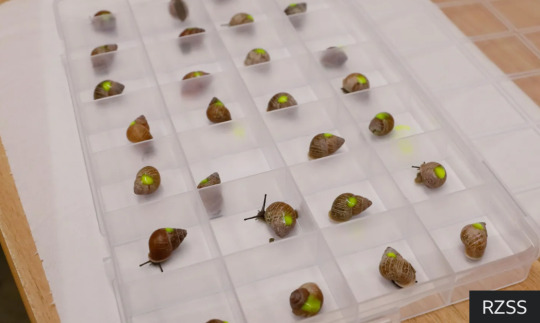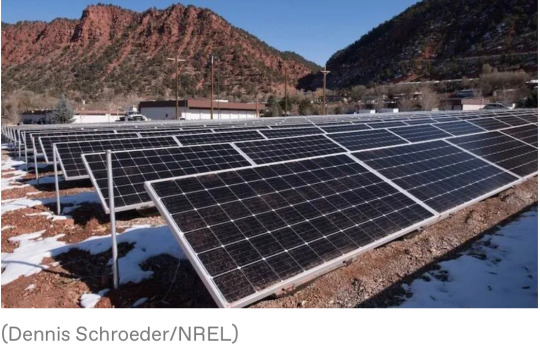#on solar panels
Explore tagged Tumblr posts
Text
"In an unprecedented transformation of China’s arid landscapes, large-scale solar installations are turning barren deserts into unexpected havens of biodiversity, according to groundbreaking research from the Chinese Academy of Sciences. The study reveals that solar farms are not only generating clean energy but also catalyzing remarkable ecological restoration in some of the country’s most inhospitable regions.
The research, examining 40 photovoltaic (PV) plants across northern China’s deserts, found that vegetation cover increased by up to 74% in areas with solar installations, even in locations using only natural restoration measures. This unexpected environmental dividend comes as China cements its position as the global leader in solar energy, having added 106 gigawatts of new installations in 2022 alone.
“Artificial ecological measures in the PV plants can reduce environmental damage and promote the condition of fragile desert ecosystems,” says Dr. Benli Liu, lead researcher from the Chinese Academy of Sciences. “This yields both ecological and economic benefits.”
The economic implications are substantial. “We’re witnessing a paradigm shift in how we view desert solar installations,” says Professor Zhang Wei, environmental economist at Beijing Normal University. “Our cost-benefit analysis shows that while initial ecological construction costs average $1.5 million per square kilometer, the long-term environmental benefits outweigh these investments by a factor of six within just a decade.” ...
“Soil organic carbon content increased by 37.2% in areas under solar panels, and nitrogen levels rose by 24.8%,” reports Dr. Sarah Chen, soil scientist involved in the project. “These improvements are crucial indicators of ecosystem health and sustainability.”
...Climate data from the study sites reveals significant microclimate modifications:
Average wind speeds reduced by 41.3% under panel arrays
Soil moisture retention increased by 32.7%
Ground surface temperature fluctuations decreased by 85%
Dust storm frequency reduced by 52% in solar farm areas...
The scale of China’s desert solar initiative is staggering. As of 2023, the country has installed over 350 gigawatts of solar capacity, with 30% located in desert regions. These installations cover approximately 6,000 square kilometers of desert terrain, an area larger than Delaware.
“The most surprising finding,” notes Dr. Wang Liu of the Desert Research Institute, “is the exponential increase in insect and bird species. We’ve documented a 312% increase in arthropod diversity and identified 27 new bird species nesting within the solar farms between 2020 and 2023.”
Dr. Yimeng Wang, the study’s lead author, emphasizes the broader implications: “This study provides evidence for evaluating the ecological benefit and planning of large-scale PV farms in deserts.”
The solar installations’ positive impact stems from several factors. The panels act as windbreaks, reducing erosion and creating microhabitats with lower evaporation rates. Perhaps most surprisingly, the routine maintenance of these facilities plays a crucial role in the ecosystem’s revival.
“The periodic cleaning of solar panels, occurring 7-8 times annually, creates consistent water drip lines beneath the panels,” explains Wang. “This inadvertent irrigation system promotes vegetation growth and the development of biological soil crusts, essential for soil stability.” ...
Recent economic analysis reveals broader benefits:
Job creation: 4.7 local jobs per megawatt of installed capacity
Tourism potential: 12 desert solar sites now offer educational tours
Agricultural integration: 23% of sites successfully pilot desert agriculture beneath panels
Carbon reduction: 1.2 million tons CO2 equivalent avoided per gigawatt annually
Dr. Maya Patel, visiting researcher from the International Renewable Energy Agency, emphasizes the global implications: “China’s desert solar model could be replicated in similar environments worldwide. The Sahara alone could theoretically host enough solar capacity to meet global electricity demand four times over while potentially greening up to 20% of the desert.”
The Chinese government has responded by implementing policies promoting “solar energy + sand control” and “solar energy + ecological restoration” initiatives. These efforts have shown promising results, with over 92% of PV plants constructed since 2017 incorporating at least one ecological construction mode.
Studies at facilities like the Qinghai Gonghe Photovoltaic Park demonstrate that areas under solar panels score significantly better in environmental assessments compared to surrounding regions, indicating positive effects on local microclimates.
As the world grapples with dual climate and biodiversity crises, China’s desert solar experiment offers a compelling model for sustainable development. The findings suggest that renewable energy infrastructure, when thoughtfully implemented, can serve as a catalyst for environmental regeneration, potentially transforming the world’s deserts from barren wastelands into productive, life-supporting ecosystems.
“This is no longer just about energy production,” concludes Dr. Liu. “We’re witnessing the birth of a new approach to ecosystem rehabilitation that could transform how we think about desert landscapes globally. The next decade will be crucial as we scale these solutions to meet both our climate and biodiversity goals.”"
-via Green Fingers, January 13, 2025
#solar#solar power#solar panel#solar energy#solar farms#china#asia#ecosystem#ecology#ecosystem restoration#renewables#biodiversity#climate change#climate action#good news#hope
1K notes
·
View notes
Text
Dandelion News - February 15-21
Like these weekly compilations? Tip me at $kaybarr1735 or check out my Dandelion Doodles!
1. Solar farms managed for nature boost bird abundance and diversity, new study finds

“There were more than twice as many farmland birds in the well-managed solar farms compared with the intensively farmed land, and nearly 16 times as many woodland birds. […] Overall, diversity was 2.5 times higher, while woodland birds were nine times more diverse.”
2. Washington judge blocks Trump’s gender-affirming care ban, says it's unconstitutional in multiple ways

“This marks the second time in a week that a judge has stood in the way of Trump’s attacks on trans kids. [… The ruling grants] a temporary restraining order that halts enforcement of provisions in Trump’s directive that would cut off federal funding to medical institutions that provide gender-affirming care to minors.”
3. Fog harvesting could provide water for arid cities

“17,000 sq m of mesh could produce enough water to meet the weekly water demand of [… the] urban slums. 110 sq m could meet the annual demand for the irrigation of the city's green spaces. Fog water could be used for soil-free (hydroponic) agriculture, with yields of 33 to 44lb (15 to 20kg) of green vegetables in a month.”
4. Audubon Applauds Bipartisan Federal Effort to Protect Delaware River Basin with Critical Reauthorization Bill

“The bill would […] ensure long-term conservation and restoration efforts, expand the official definition of the basin to include Maryland, and prioritize projects that serve small, rural, and disadvantaged communities. […] The watershed provides important year-round habitats and critical migratory stopovers for approximately 400 bird species[….]”
5. mRNA vaccines show promise in pancreatic cancer in early trial
“Half of the people in the study — eight of the participants ��� responded to the vaccine, producing T cells that targeted their tumors. […] Just two of the patients who had a response to the vaccine had their cancer return during the three-year follow- up, compared to seven of the eight who did not respond to the vaccine treatments.”
6. Minn. Lt. Gov. Flanagan Makes It Official; She's running for U.S. Senate

“[Flanagan has] “championed kitchen-table issues like raising the minimum wage, paid family and medical leave, and free school meals.” If elected, Flanagan, a tribal citizen of the White Earth Nation, would become the first Native American female U.S. senator in history.”
7. Federal Funding Restored for Low-Income Alabama Utility Assistance After Outcry

“A program meant to help low-income Alabamians pay their utility bills has resumed two weeks after it was canceled due to an executive order from President Donald Trump. […] “We can confirm the funds are reaching those affected by the previous pause[….]””
8. Modeling study suggests Amazon rainforest is more resilient than assumed

“[Previous] studies were either conducted with global climate models that used a simplified representation of convection [or were on a regional scale….] According to the computations, mean annual precipitation in the Amazon does not change significantly even after complete deforestation.“
9. States are moving forward with Buy Clean policies despite Trump reversal

““Buy Clean is a great example of how states and other nonfederal actors can continue to press forward on climate action, regardless of what the federal government does,” said Casey Katims, executive director of the U.S. Climate Alliance, a bipartisan coalition of two dozen governors.”
10. The rewilded golf courses teeming with life

“A wildflower meadow, ponds, scrub habitat, coastline and even an area of peat bog can be found on this little 60-acre (24-hectare) plot, which boasts roe deer, otters, lizards, eels and a huge array of insects and birds.”
February 8-14 news here | (all credit for images and written material can be found at the source linked; I don’t claim credit for anything but curating.)
#hopepunk#good news#nature#us politics#solar power#solar panels#solar energy#birds#biodiversity#gender affirming care#transgender#trans rights#trans healthcare#water conservation#habitat#migratory birds#vaccines#vaccination#mrna vaccine#pancreatic cancer#cancer#native american#alabama#low income#amazon rainforest#rainforest#executive orders#climate action#golf course#habitat restoration
980 notes
·
View notes
Text
Global Anti-Icing Coating Market Size– Forecasts to 2032: AMR
0 notes
Text
thanks to @krill-joy for the article!
#sheep#solar farms#good news#environmentalism#usa#solar panels#solar energy#solar power#environment#nature#animals#science#climate change#climate crisis
677 notes
·
View notes
Text




A collection of hydroponics and solar powered machines I did over the years🌻
There is something about machines that work together with nature, instead against it, that keeps facinating me. I hope to explore this more in the future!
#dinchenix#solarpunk aesthetic week#pixel#pixel art#pixelart#artists on tumblr#art#solarpunk#my art#hydroponics#aquaponics#solar panels
597 notes
·
View notes
Text

365 notes
·
View notes
Text


team superman secret files
do you ever think about how cute kon's actual canon feelings about superman are. hes just a little guy and he looks up to clark sooooo much 🥺🥺🥺 (also that he feels like john henry is kinda like his uncle... 🩷)
#rimi's comic liveblogging#kon#clark#john henry#superfam#also the little side panel thats like he's SUCH a good imitation of superman that he's even a solar battery! and vulnerable to kryptonite!#WE SWEAR HES JUST AN IMITATION THO HES TOTALLY NOT KRYPTONIAN WE SWEAR WE PROMMY--#its so fucking funny. like. right okay sure i believe you
238 notes
·
View notes
Text
It's weird how so many people seem to associate crows with the night. I guess because they're black?
Crows sleep through the night, though. In fall and winter you can see them flying off to gather in large roosts just around sunset. I can think of only one encounter I've had with a crow after dark, and that crow was very much dying.
Anyway, the point is that crows are creatures of sunlight. There are a lot of "witchy" crow and moon motifs around, but there should really be more crow and sun.
2K notes
·
View notes
Text







Mobility Outfitters Gearbox Concept, 1998. Described by its designer as "a space vehicle for Earth exploration," the Gearbox was presented at the North American International Auto Show. Features included Solar panels to charge batteries that powered ancillaries when the vehicle was stationary. They also allowed stand-up head room in the cabin when deployed. It was equipped for all-terrain camping with storage compartments below the rear tray. It didn't progress beyond prototype stage and is now part of the collection at the Petersen Automotive Museum
#Mobility Outfitters#Mobility Outfitters Gearbox Concept#Mobility Outfitters Gearbox#concept#prototype#design study#ATV#all terrain vehicle#solar panels#camper#RV#1998#North American International Auto Show
383 notes
·
View notes
Text

#HighPerch
Mountainous Parts of the Northern Hemisphere.
@BenAdrienProulx September 12, 2024.
#High Perch#Solar Panels Canada#Near the Hedge#High Above#Silent Hill#Wilderness Need Protection#IUCN#International Union for Conservation of Nature#ECCC#Environment and Climate Change Canada#Count Feeder Birds for Science#NCC#Nature Conservancy of Canada#Raw Nature#Nature Photography#Nature Canada#Wildlife Photography#Mountainous Parts of the Northern Hemisphere#Canada#Mohawk Native Reserve#The RavenKeeper
362 notes
·
View notes
Text

#my art#battle nurse#guard gob#battle nurse solar panel for sex machine#acting like nothing even happened 😭#my ocs
367 notes
·
View notes
Text


"To mitigate the negative impacts of climate change, the world needs to quickly transition from fossil fuels to low-carbon energy sources such as solar power.
The chart shows how much this transition has accelerated in the last two decades.
In 2004, it took the world about a year to add one gigawatt of solar power capacity. By 2023, the same amount was added, on average, every single day.
For reference, a gigawatt of solar is enough to power approximately 200,000 homes in the US.
Much of this growth has been driven by China, which by 2023 accounted for about 43% of the cumulative installed capacity worldwide.
A big reason for this acceleration has been a large decrease in the price of solar panels. Since 2001, the price has dropped by about 95%, from $6.21 to $0.31 per watt.
Learn more about why renewables like solar became so cheap so fast."
-via Our World in Data, February 6, 2025
#solar#solar power#china#global#clean energy#renewables#renewable energy#solar panels#green energy#solar energy#good news#hope
1K notes
·
View notes
Text
Dandelion News - September 8-14
Like these weekly compilations? Tip me at $kaybarr1735 or check out my new(ly repurposed) Patreon!
1. Pair of rare Amur tiger cubs debuting at Minnesota Zoo are raising hopes for the endangered species

“[The Minnesota Zoo’s] Amur tigers have produced 57 cubs, [… 21 of which] have gone on to produce litters of their own, amounting to another 86 cubs. […] “They’re showing a lot of resiliency, which is something that we work hard for in human care. We want these animals to have a lot of confidence and be able to adapt to new environments just as they’re doing today.””
2. Powered by renewable energy, microbes turn CO₂ into protein and vitamins

“The team designed a two-stage bioreactor system that produces yeast rich in protein and vitamin B9. [… The protein] levels in their yeast exceed those of beef, pork, fish, and lentils. […] Running on clean energy and CO2, the system reduces carbon emissions in food production. It uncouples land use from farming, freeing up space for conservation[… and] will help farmers concentrate on producing vegetables and crops sustainably.”
3. JCPenney Launches Apparel Collection Aimed At Wheelchair Users

“A major department store is rolling out a new line of clothing specifically tailored to meet the needs of women who use wheelchairs featuring options for both everyday wear and special occasions. [… The clothing have] modifications like zippers located for easy access, pocket positioning and extended back rises optimized for the seated position and shorter sleeves to limit interference with wheels.”
4. Snails bred in Edinburgh Zoo sent to re-populate species in French Polynesia

“Thousands of rare partula snails bred at Edinburgh Zoo are to be released in French Polynesia to restore the wild population of the species.The last surviving few of the species were rescued in the early 1990s[….] 15 species and sub-species [are being bred in zoos for repopulation], the majority of which are classed as extinct in the wild.”
5. [NH Joins 19 Other States] to Provide Essential Behavioral Health Services Through Mobile Crisis Intervention Teams
“[CMS] approved New Hampshire’s Medicaid State Plan Amendment for community-based mobile crisis intervention teams to provide services for people experiencing a mental health or substance use disorder crisis. […] The multidisciplinary team provides screening and assessment; stabilization and de-escalation; and coordination with and referrals to health, social, and other services, as needed.”
6. Recovery plan for Missouri population of eastern hellbender

“It is expected that recovery efforts for the Missouri DPS of the eastern hellbender will reduce sedimentation and improve water quality in the aforementioned watersheds, which will also improve drinking water, as well as benefit multiple federally listed mussels, sport fish and other aquatic species.”
7. How $7.3B will help rural co-ops build clean power—and close coal plants

“[The funds are] serving about 5 million households across 23 states [… to] build wind and solar power, which is now cheaper than coal-fired power across most of the country. […] Some of it will be used to pay down the cost of closing coal plants[….] federal funding could help co-ops secure enough wind, solar, and battery resources to retire their entire coal capacity by 2032, cutting carbon emissions by 80 to 90 percent and reducing wholesale electricity costs by 10 to 20 percent[….]”
8. Native-led suicide prevention program focuses on building community strengths

“[Indigenous researchers have] designed programs that aim to build up a community’s endemic strengths, rather than solely treating the risks facing individuals within that community. By providing support and resources that enable access to Alaska Native cultural activities, they hope to strengthen social bonds that build resilience. […] “In a Yup’ik worldview, suicide is not a mental health disorder, and it’s not an individual affliction, it’s a disruption of the collective.””
9. Another rare Javan rhino calf spotted at Indonesia park

“A new Javan rhino calf has been spotted in an Indonesian national park, the facility's head said Friday, further boosting hopes for one of the world's most endangered mammals after two other […] calves were spotted earlier this year at the park, which is the only habitat left for the critically endangered animal.”
10. Transparent solar cells can directly supply energy from glass surfaces

“[Researchers have] unveiled a method of supplying energy directly from glass of buildings, cars, and mobile devices through transparent solar cells. […] It has also succeeded in charging a smartphone using natural sunlight. It also proved the possibility that a screen of a small mobile device can be used as an energy source.”
September 1-7 news here | (all credit for images and written material can be found at the source linked; I don’t claim credit for anything but curating.)
#hopepunk#good news#nature#tiger#endangered species#sustainability#animals#nutrition#jc penney#wheelchair user#adaptive clothing#fashion#snail#edinburgh#scotland#french polynesia#mental health#new hampshire news#missouri#hellbenders#salamander#wind energy#solar power#clean energy#native#community#rhino#technology#baby animals#solar panels
504 notes
·
View notes
Text
so wait
the green energy parts of the Inflation Reduction Act have brought tons of jobs and money to mostly Republican districts?
and as a result, Republicans will pressure Trump not to gut those aspects of the law?
I am. cackling.
(I mean the man's a loose cannon, so god knows if he'll actually listen. but climate is my biggest worry with this administration, so this gives me a sliver of hope)
(that and him having made Mr. Electric Car Magnate his crony, so he's had to walk back negative statements about those, too)
#us politics#current events#shocker: green energy projects actually make economic sense too!#people want them and they bring jobs to places that coal and oil never could!#because you don't have to have fossil fuels present in the ground to make EVs or solar panels#or put up wind turbines#or whatever#WHO would have GUESSED?!?!?!
319 notes
·
View notes
